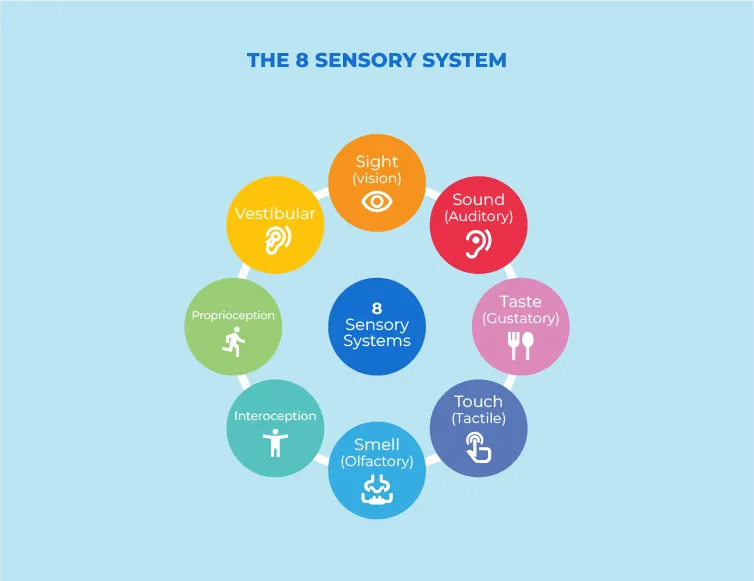Sensory Processing
& Dyspraxia
Sensory processing is how the brain takes in and responds to information from the world around us and from inside our own bodies. For many neurodivergent people (especially those with ADHD, Autism, and Tourette’s Syndrome), this system works differently.
When sensory input is too strong, too weak, or hard to understand, it can lead to:
✔ Overwhelm
✔ Anxiety
✔ Meltdowns or shutdowns
✔ Confusion
Two Common Types of Sensory Processing Challenges
Autism and ADHD are neurodevelopmental conditions, not illnesses. They shape how people think, feel, and experience the world. Everyone’s profile is different, no two people with Autism or ADHD are the same.
Autism often involves differences in communication, social interaction, sensory processing, and routines.
ADHD is usually linked to attention, focus, organisation, and impulsivity—but can also bring high energy, creativity, and problem-solving skills.
Many people have traits of both, which can make daily life a mix of strengths and struggles.
1. Sensory Modulation Difficulties
Trouble regulating responses to sensory input, which can look like:
✔ Overreacting to sounds, lights, or touch.
✔ Seeking constant movement or pressure.
✔ Fluctuating between hyper- and hypo-sensitivity.
2. Sensory Discrimination Difficulties
Difficulty telling the difference between sensory inputs or locating them accurately. This may show up as:
✔ Not knowing where a sound came from.
✔ Trouble coordinating movement or using the right force.
✔ Not noticing injuries or hunger cues.
“Struggling with movement, balance, or sensory overwhelm doesn’t mean you’re incapable, it simply means your body and brain process the world in a different way. With the right support, those challenges can be understood, managed, and even turned into strengths.”
The 8 Sensory Systems (Yes, Eight!)
Most people know the five senses, but we actually have eight:
✔ Visual (Sight) – Sensitivity to bright lights or fast movement.
✔ Auditory (Hearing) – Overwhelm from background noise; painful reactions to sounds.
✔ Tactile (Touch) – Irritation from light touch; calming from deep pressure; discomfort with clothing textures.
✔ Olfactory (Smell) – Strong smells causing nausea or distraction.
✔ Gustatory (Taste) – Picky eating or strong reactions to textures/flavours.
✔ Vestibular (Balance & Movement) – Trouble with spinning, swinging, balancing; craving or avoiding movement.
✔ Proprioceptive (Body Awareness) – Clumsiness, bumping into things, seeking squeezing or pressure.
✔ Interoception (Internal Signals) – Difficulty recognising hunger, thirst, needing the toilet, pain, or emotions.

Why Sensory Regulation Matters
When the sensory system is unregulated, it can trigger:
✔ Anxiety & exhaustion.
✔ Emotional outbursts & difficulty regulating emotions.
✔ Increased hyperactive thinking (ADHD).
✔ Difficulty concentrating.
✔ Communication struggles.
✔ Heightened internal sensations & tics.
✔ Constant fight/flight/freeze response
✔ Interoception (Internal Signals) – Difficulty recognising hunger, thirst, needing the toilet, pain, or emotions.

Dyspraxia (DCD) & Sensory Processing
Dyspraxia, also known as Developmental Coordination Disorder (DCD), is a neurodevelopmental condition affecting planning, sequencing, and coordinating movement.
It’s not caused by weak muscles—it’s about how the brain processes information and sends signals to the body.
Many people with dyspraxia also experience sensory challenges, especially with balance (vestibular), body awareness (proprioception), and touch (tactile).
How Dyspraxia Interacts with the Sensory System
Many conditions share sensory traits, such as:
✔ ADHD → sensory seeking (movement/fidgeting).
✔ Autism → sensory sensitivity (avoiding loud/busy places).
✔ Tourette’s → internal sensory dysregulation (tics harder to manage).
Overlap with Other Neurodivergent Conditions
With early intervention and personalised strategies, people can build confidence, independence, and coping tools for daily life.
Your sensory system is the foundation of how you experience the world—understanding it changes everything.
👉 Want to learn more? Explore our pages on Autism, ADHD, and Tourette’s.
Diagnosis Pathways
If you’re exploring assessment for sensory processing differences or dyspraxia, I can support you to understand the options available and what each step may involve:
✔ How dyspraxia (DCD) is diagnosed through GP referrals, NHS pathways, and occupational therapy assessments.
✔ The role of private assessments and when they may be helpful.
✔ What to expect during the process, from observations to developmental history, and how to prepare for appointments.
"Supporting sensory regulation helps reduce overwhelm, improve focus, and build emotional and physical wellbeing."
Copyright 2024 - 2026. Flourish with Neurodiversity. All Rights Reserved.
Website designed by South Coast Design

